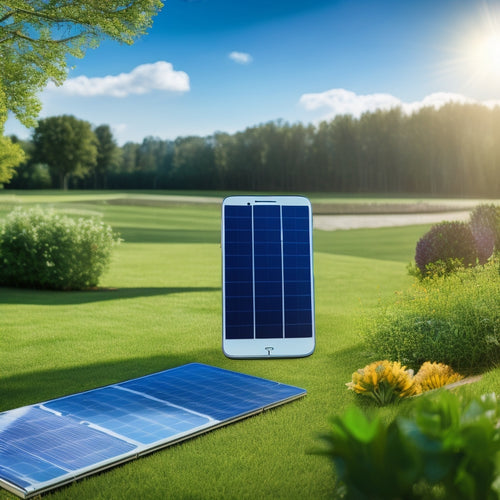
Find Local Budget-Friendly Solar Installers: DIY Guide
Share
To find local budget-friendly solar installers, start by researching local companies and seeking recommendations from friends, family, or neighbors with solar experience. Verify licenses and certifications through the state licensing board and organizations like NABCEP. Compare prices and services from multiple installers, evaluating financing options, system specifications, and additional services offered. Ask about warranty and support, including coverage, maintenance requirements, and customer service channels. By taking these steps, you'll be well on your way to finding a reliable and affordable solar installer - and there's more to investigate to guarantee you make an informed decision.
Key Takeaways
- Research local solar installers through recommendations, trade organizations, and online directories to find competitive pricing and quality equipment.
- Verify installer licenses and certifications through state licensing boards and organizations like NABCEP to ensure reliability and compliance.
- Compare prices and services among installers, considering financing options, equipment quality, and maintenance support to determine overall value.
- Evaluate warranty and support offered by installers, including warranty length, maintenance requirements, and customer service channels.
- Assess installation quality by examining workmanship, materials, and certifications to ensure a sustainable and efficient solar installation.
Research Local Solar Installers
Researching local solar installers is an essential step in finding the right professional for your solar panel installation project.
You'll want to identify installers who offer competitive pricing, quality equipment, and reliable services. Start by asking friends, family, or neighbors who've already gone solar for recommendations.
You can also check with local trade organizations or industry associations for a list of certified installers in your area.
Be sure to inquire about their experience with solar financing options, such as power purchase agreements or leases, and community solar programs that can help you save even more.
Check Online Review Platforms
With a list of potential solar installers in hand, you're ready to plunge deeper into their reputations by checking online review platforms.
These platforms provide useful perspectives into an installer's work quality, customer service, and overall reliability.
-
Yelp: Look for ratings, reviews, and customer testimonials that highlight an installer's strengths and weaknesses.
-
Google Reviews: Analyze the overall rating and pay attention to comments about the installation process, equipment quality, and post-installation support.
-
Facebook Reviews: Check social media feedback to see how installers engage with customers, respond to concerns, and showcase their work.
Verify Licenses and Certifications
You'll want to verify the solar installer you're considering has the necessary licenses and certifications to perform the job safely and efficiently.
To do this, you'll need to check their licenses through the relevant state licensing board or agency, and check their certification status with organizations like the North American Board of Certified Energy Practitioners (NABCEP).
License Verification Process
As you investigate the world of solar installers, verifying licenses and certifications becomes an essential step in ensuring you're dealing with a competent professional.
You need to confirm that the installer meets the necessary regulatory requirements and follows installation guidelines.
To verify licenses, you should:
- Check with your state's licensing board to confirm the installer's license is active and in good standing.
- Review the installer's certifications, such as those from the North American Board of Certified Energy Practitioners (NABCEP).
- Validate the installer's compliance with local building codes and permits.
Check Certification Status
Verifying an installer's certification status is an essential step in confirming their competence. You want to ascertain they have the necessary knowledge to handle your solar technology installation efficiently. Check for certifications from reputable organizations like the North American Board of Certified Energy Practitioners (NABCEP) or the International Association of Electrical Inspectors (IAEI).
| Certification | Organization | Description |
|---|---|---|
| NABCEP PV Installation Professional | NABCEP | Demonstrates proficiency in solar PV installation, design, and safety |
| Certified Solar Installer (CSI) | IAEI | Verifies knowledge of solar electric systems, energy efficiency, and electrical codes |
| Certified Energy Auditor (CEA) | Building Performance Institute (BPI) | Confirms understanding of energy efficiency and building science principles |
| OSHA Certification | Occupational Safety and Health Administration (OSHA) | Confirms knowledge of workplace safety and hazard prevention |
| Manufacturer's Certification | Various | Validates training and knowledge in specific solar technology products |
Compare Prices and Services
Comparing prices and services among budget-friendly solar installers is essential to finding the best deal for your specific needs.
You'll want to evaluate each installer's quote to guarantee you're getting the best value.
-
Financing options: Review the financing plans offered by each installer, including any interest rates, payment terms, and incentives.
-
Installation timelines: Compare the projected installation timelines, including the start and completion dates, to confirm they fit your schedule.
-
System specifications: Verify the system's specifications, such as the type and quality of equipment, to ascertain it meets your energy needs.
Ask About Warranty and Support
You've narrowed down your options by evaluating financing plans, installation timelines, and system specifications.
Now, it's essential to ask about warranty and support. A thorough warranty should cover the solar panels, inverters, and other equipment for at least 25 years.
Additionally, inquire about the installation maintenance requirements and who'll be responsible for them. Will the installer provide regular inspections and repairs, or will you need to hire a third party?
Assess the customer service offered, including response times, support channels, and escalation procedures. Confirm you understand the process for filing claims and resolving issues.
A reliable warranty and support system will give you peace of mind and protect your investment.
Evaluate Installation Quality
When evaluating a solar installer's quality of work, you'll want to assess the workmanship and materials used, as well as the certifications and accreditations held by the installation team.
Additionally, you should examine the warranty and support offered, including the duration and scope of coverage. By scrutinizing these factors, you'll be able to gauge the installer's commitment to providing a high-quality solar panel system.
Workmanship and Materials Used
Evaluating the quality of a solar installation involves scrutinizing the workmanship and materials used, as these factors greatly impact the system's performance, durability, and overall value.
You want to guarantee that the installer uses proper installation techniques, such as securing panels at the correct angle and guaranteeing a watertight seal.
Here are key aspects to examine:
-
Material sustainability: Are the materials used eco-friendly and sourced from environmentally responsible suppliers?
-
System design: Is the system designed to optimize energy production and adapt to your energy needs?
-
Workmanship quality: Are the installers experienced, and do they follow industry best practices to guarantee a safe and efficient installation?
Certifications and Accreditations Held
Three key certifications can greatly impact the quality of your solar installation: those held by the installer, the equipment, and the installation process itself.
You want to guarantee your installer has the necessary certifications, such as the North American Board of Certified Energy Practitioners (NABCEP) certification, which demonstrates their proficiency in solar installation.
Accreditation differences are also vital, as they indicate the level of quality control in place. Look for installers with International Organization for Standardization (ISO) accreditation, which confirms their processes meet global standards.
Certification significance can't be overstated, as it directly affects the performance and longevity of your solar system.
Warranty and Support Offered
Beyond certifications, an essential aspect to evaluate is the warranty and support offered by your solar installer, as it directly correlates to the quality of the installation.
You need to assess the warranty options and support services provided to guarantee you're protected in case something goes wrong.
When evaluating warranty and support, consider the following:
- Length of warranty: How long is the warranty period, and what does it cover?
- Type of support: What kind of support services does the installer offer, such as maintenance, repair, and monitoring?
- Response time: How quickly will the installer respond to issues or concerns you may have?
Frequently Asked Questions
Can I Install Solar Panels on My Roof With Existing Skylights?
You'll need to assess skylight considerations, ensuring panels don't obstruct natural light, and address installation challenges like modified flashing and waterproofing to safely integrate solar panels with your existing skylights, requiring careful planning and execution.
Do Solar Installers Provide Maintenance and Repair Services?
You think solar panels are a 'set it and forget it' deal? Think again! Solar installers often provide maintenance and repair services to guarantee your system runs efficiently throughout its 25-30 year lifespan, following strict maintenance schedules to prevent issues.
Are There Any Government Incentives for Solar Panel Installation?
You'll be pleased to know that, yes, you can benefit from government incentives for solar panel installation, including tax credits and solar rebates, which can greatly reduce your upfront costs and increase your return on investment.
Can I Finance My Solar Panel Installation Through a Lender?
You can finance your solar panel installation through a lender, exploring various financing options that meet lender requirements, such as credit score, income, and loan terms, to find the best fit for your budget and energy goals.
How Long Does a Typical Solar Panel Installation Process Take?
Like a skilled chef preparing an intricate dish, you're orchestrating a solar installation project. Typically, the installation timeline unfolds over 2-6 months, with permits, inspections, and setup taking 1-3 weeks, and the actual project duration varying depending on system complexity and installer efficiency.
Related Posts
-

3 Ways Wind Power Boosts Home Value
Living near a wind farm can enhance your property's value in three significant ways. To begin with, proximity to wind...
-

7 Best Solar Panel Upkeep Apps for Homeowners
You can optimize your solar panel's energy output and efficiency by up to 20% with regular maintenance, which is wher...
-

Transform Your Outdoor Space With Recycled Plastic Lumber
By incorporating recycled plastic lumber into your outdoor design, you're not just building a deck or installing a fe...


